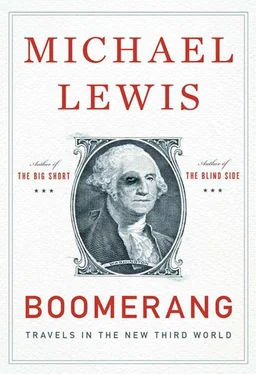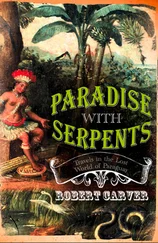Not long after Doukas began his new job, two monks showed up unannounced in his Finance Ministry office. One was Father Ephraim, of whom Doukas had heard; the other, unknown to Doukas but clearly the sharp end of the operation, a fellow named Father Arsenios. They owned this lake, they said, and they wanted the Ministry of Finance to pay them cash for it. “Someone had given them full title to the lake,” says Doukas. “What they wanted now was to monetize it. They came to me and said, ‘Can you buy us out?’” Before the meeting, Doukas sensed, they had done a great deal of homework. “Before they come to you they know a lot about you—your wife, your parents, the extent of your religious beliefs,” he said. “The first thing they asked me was if I wanted them to take my confession.” Doukas decided that it would be unwise to tell the monks his secrets. Instead he told them he would not give them money for their lake—which he still didn’t see how exactly they had come to own. “They seemed to think I had all this money to spend,” says Doukas. “I said, ‘Listen, contrary to popular opinion, there is no money in the Finance Ministry.’ And they said, ‘Okay, if you cannot buy us out, why can’t you give us some of your pieces of land?’”
This turned out to be the winning strategy: exchanging the lake, which generated no rents, for government-owned properties that did. Somehow the monks convinced government officials that the land around the lake was worth far more than the 55 million euros an independent appraiser later assessed its value as, and then used that higher valuation to ask for 1 billion euros’ worth of government property. Doukas declined to give them any of the roughly 250 billion euros’ worth controlled by the Ministry of Finance. (“No fucking way I’m doing that,” he says he told them.) The monks went to the source of the next most valuable land—farmlands and forests controlled by the Ministry of Agriculture. Doukas recalls, “I get a call from the minister of agriculture saying, ‘We’re trading them all this land, but it’s not enough. Why don’t you throw in some of your pieces of land, too?’” After Doukas declined, he received another call—this one from the prime minister’s office. Still he said no. Next he receives this piece of paper saying he’s giving the monks government land, and all he needs to do is sign it. “I said, ‘Fuck you, I’m not signing it.’”
And he didn’t—at least not in its original form. But the prime minister’s office pressed him; the monks, it seemed to Doukas, had some kind of hold on the prime minister’s chief of staff. That fellow, Giannis Angelou, had come to know the monks a few years before, just after he had been diagnosed with a life-threatening illness. The monks prayed for him; he didn’t die, but instead made a miraculous recovery. He had, however, given them his confession.
By now Doukas thought of these monks less as simple con men than as the savviest businessmen he had ever dealt with. “I told them they should be running the Ministry of Finance,” he says. “They didn’t disagree.” In the end, under pressure from his boss, Doukas signed two pieces of paper. The first agreed not to challenge the monks’ ownership of the lake; the second made possible the land exchange. It did not give the monks rights to any lands from the Finance Ministry, but, by agreeing to accept their lake into the Ministry of Finance’s real estate portfolio, Doukas enabled their deal with the minister of agriculture. In exchange for their lake the monks received seventy-three different government properties, including what had formerly been the gymnastics center for the 2004 Olympics—which, like much of what the Greek government built for the Olympic Games, was now empty and abandoned space. And that, Doukas assumed, was that. “You figure they are holy people,” he says. “Maybe they want to use it to create an orphanage.”
What they wanted to create, as it turned out, was a commercial real estate empire. They began by persuading the Greek government to do something it seldom did: to rezone a lot of noncommercial property for commercial purposes. Above and beyond the lands they received in their swap—which the Greek parliament subsequently estimated to be worth a billion euros—the monks, all by themselves, were getting 100 percent financing to buy commercial buildings in Athens and to develop the properties they had acquired. The former Olympics gymnastics center was to become a fancy private hospital—with which the monks obviously enjoyed a certain synergy. Then, with the help of a Greek banker, the monks drew up plans for something to be called the Vatopaidi Real Estate Fund. Investors in the fund would, in effect, buy the monks out of the properties given to them by the government. And the monks would use the money to restore their monastery to its former glory.
From an ancient deed to a worthless lake the two monks had spun what the Greek newspapers were claiming, depending on the newspaper, to be a fortune of anywhere from tens of millions to many billions of dollars. But the truth was that no one knew the full extent of the monks’ financial holdings; indeed, one of the criticisms of the first parliamentary investigation was that it had failed to lay hands on everything the monks owned. On the theory that if you want to know what rich people are really worth you are far better off asking other rich people—as opposed to, say, journalists—I polled a random sample of several rich Greeks who had made their fortune in real estate or finance. They put the monks’ real estate and financial assets at less than $2 billion but more than $1 billion—up from zero since the new management took over. And the business had started with nothing to sell but forgiveness.
The monks didn’t finish with church until one in the morning. Normally, Father Arsenios explained, they would be up and at it all over again at four. On Sunday they give themselves a break and start at six. Throw in another eight hours a day working the gardens, or washing dishes, or manufacturing crème de menthe, and you can see how one man’s idea of heaven might be another’s of hell. The bosses of the operation, Fathers Ephraim and Arsenios, escape this grueling regime roughly five days a month; otherwise this is the life they lead. “Most people in Greece have this image of the abbot as a hustler,” another monk, named Father Matthew, from Wisconsin, says to me in a moment of what I take to be candor. “Everyone in Greece is convinced that the abbot and Father Arsenios have their secret bank accounts. It’s completely mad if you think about it. What are they going to do with it? They don’t take a week off and go to the Caribbean. The abbot lives in a cell. It’s a nice cell. But he’s still a monk. And he hates leaving the monastery.”
The knowledge that I am meant to be back in the church at six in the morning makes it more, not less, difficult to sleep, and I’m out of bed by five. Perfect silence: it’s so rare to hear nothing that it takes a moment to identify the absence. Cupolas, chimneys, towers, and Greek crosses punctuate the gray sky. Also a pair of idle giant cranes: the freezing of the monks’ assets has halted restoration of the monastery. At 5:15 come the first rumblings from inside the church; it sounds as if someone is moving around the icon screens, the sweaty backstage preparations before the show. At 5:30 a monk grabs a rope and clangs a church bell. Silence again and then, moments later, from the monk’s long dormitory, the beep beep beep of electric alarm clocks. Twenty minutes later monks, alone or in pairs, stumble out of their dorm rooms and roll down the cobblestones to their church. It’s like watching a factory springing to life in a one-industry town. The only thing missing are the lunch pails.
Читать дальше












